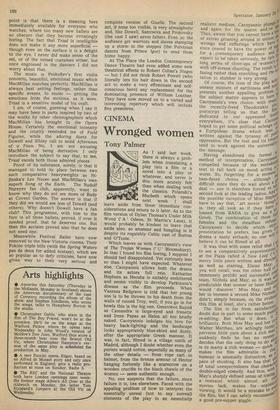BALLET
Odd man out
Robin Young
My heart fell at the start of Kenneth MacMillan's new Covent Garden ballet, Triad. At the sight of Peter Unsworth's spangled seaweedy setting and Anthony Dowell's first slow and stretching movements I thought: "Oh, God, we're underwater again." I have diagnosed in myself an advanced case of balletic hydrophobia, an instinctive aversion to dancers playing fishes or drowned bodies. But in this case my fear was misplaced. The ballet quickly came up to air and took flight.
It starts with two brothers alone in fond and close relationship on the stage. Enter — in. those extended, graceful steps — Antoinette Sibley, and their troubles begin. While Anthony Dowell, the older or more self-confident brother, becomes involved with her — eventually in a series of most intricate and difficult lifts quite sublimely performed — the younger brother, Wayne Eagling, imitative, insecure and perhaps dependent, becomes increasingly frantic in his efforts to intervene or distract attention. He becomes a nuisance, and is abandoned to the rough treatment and abuse of a trio of companions. At the end he is shown some compassion by the brother and his girl and then, finally, excluded. He ends crouched in grief over their union.
Others will, of course, read more into it. Some no doubt will not be content with a merely fraternal relationship between the two principal males. No matter — the point is that there is a meaning here immediately available for everyone who watches, where too many new ballets are so obscure that they become irritatingly boring. The fact that Triad is intelligible does not make it any more superficial — though even on the surface it is a delight to the eye. I never did make sense of the set, or of the veined costumes either, but once engrossed in the dancers I did not worry about that.
The music is Prokofiev's first violin concerto, beautiful, emotional music which MacMillan matches perfectly. MacMillan is always best setting feelings, rather than specific events, to music — getting the emotions from the motions, as it were. Triad is a sensitive model of his craft.
I am, of course, guessing when I say it may have been in parts inspired by two of the works by other choreographers which MacMillan has brought to the Opera House. Certainly the emotional intensity and the cruelty reminded me of Field Figures, while the adoring duets for Dowell and Sibley call to mind Afternoon of a Faun. No, I am not accusing MacMillan of being derivative. I only introduce the subject to say that, to me, Triad excels both those admired pieces.
Proof of its substance, surely, is that it managed to hold its place between two such comparative heavyweights as Nijinska's Les Noces and MacMillan's own superb Song of the Earth. The Rudolf Nureyev fan club, apparently, want to know why they do not see more of Rudy at Covent Garden. The answer is that if they did we would see less of Dowell (and others). Why doesn't Dowell have a fan club? This programme, with him to the fore in all three ballets, proved, if ever it needed proof, that he deserves one. But then the acclaim proved also that he does not need one.
Meanwhile Festival Ballet have now removed to the New Victoria cinema. Their Fokine triple bills (with the Spring Waters pas de deux for added ecstasy), which are so popular as to defy criticism, have now given way to their very serious and complete version of Giselle. The second act, if none too visible, is very atmospheric and, like Dowell, Samtsova and Prokovsky (the cast I saw) never falters. Even so the audience get warriors and slaves stamping up a storm in the steppes (the Polvtsian dances from Prince Igor) to send them home happy.
At The Place the London Contemporary Dance Theatre had even added some new theatrical effects to Robert Cohan's Stages — but I did not think Robert Powell (who literally lets his hair down in the second act to make a very effeminate and selfconscious hero) any replacement for the dominating presence of William Louther. They have now moved on to a varied and interesting repertory which will include five premieres.











































 Previous page
Previous page